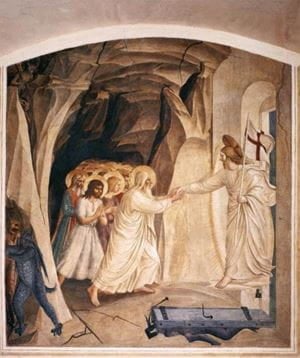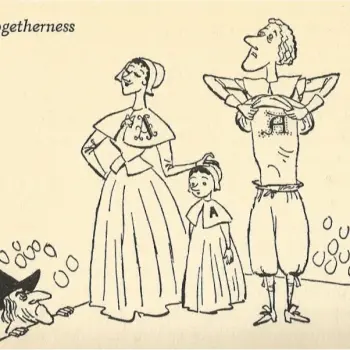
Jonathan Jackson’s prose-poem, The Harrowing of Hell, peers unblinkingly into a dark and wordless mystery. Christians understand this mystery to be the darkest hour in all of human history: the three days Jesus of Nazareth lay dead in the grave after his crucifixion at the hands of the Roman empire. What happened to Jesus—body and spirit—before his resurrection?
Christian doctrine teaches that during those three days, Jesus descended to the realm of the dead. There, he freed the souls of those who longed for him in true faith but had not yet met him because they departed Earth before Jesus lived and died as the sacrifice necessary to usher them, forgiven and pure, into God’s eternal presence. This epic, merciful quest for their freedom is known as the Harrowing of Hell.
Jackson’s The Harrowing of Hell does not flinch at the thought of the God of Light slain by darkness. Rather, Jackson’s sacred imagination casts a vision of the most powerful and most intimate jailbreak ever executed.
Hell, as envisioned by Jackson, bears striking similarities to Dante Alighieri’s stratified underworld of The Divine Comedy. At the opening of Jackson’s Prologue, the spirit of Jesus lies dead on a “blasphemous altar” surrounded by jeering throngs of demons and wraiths, presided over by the Prince of Darkness himself, Satan. To commence the great feast, Satan stabs Jesus through the heart, pronouncing him permanently separated from the Kingdom of Heaven. Then, just as the crowds cry out, “GOD IS DEAD,” Jesus disappears in a flash of light.
Section I then turns to Christ, standing tall on “His ghostly feet, aching from the punctured nail-wounds” of his crucifixion, prepared to stop at nothing to offer freedom to each and every soul.
He comes first to Absalom, King David’s traitorous son, and calls to him: “Precious Absalom, I have come to bring you home; to your Heavenly Father, and to your earthly father, David.” Jesus goes on, “I have paid for your sins, Absalom; . . . even the betrayal of your father. Come with me. No shame awaits you, only grace and mercy.” Demons emerge to torment Absalom, calling Jesus a liar and amplifying the all-too-familiar voice of shame: “Imagine; imagine the weight of those saintly bystanders, gazing at you in horror.” But Jesus silences them with only his voice, and “astonishingly, the lost son of David reached out his withering hand” and, Jackson writes, “immediately, the phantom-chains broke and fell lifeless to the ground.”
No pyrotechnics or bolt-cutters; the voice of Christ speaking Absalom’s belovedness is all that is needed to melt the phantom-chains of shame binding Absalom to his demons.
Thus begins a tidal wave of Christ’s “intimate acts of liberation.” As Jackson imagines them, each liberation is deeply personal and holds as sacred the individual soul’s right to refuse Christ. The poem explores encounters with Biblical figures including Absalom, Delilah, Jezebel, and even Adam and Eve, who are each extended the same hand of mercy and invited to come home.
Jackson’s vision even includes Christ’s coming to what is known as the “bosom of Abraham,” or, the resting place of the saints “who gave their lives in complete surrender to the Light they were shown during the temporal age.” Resting there, Jackson envisions “pagan sages and philosophers” including Taoist philosopher Lao Tzu, Socrates, Plato, and Pythagoras, along with Noah, Abraham, Isaac and Jacob amidst “a sea of faces outnumbering the stars in the sky.”
Readers of Jackson’s poem will hold their breath not only as Jesus fights Leviathans in the River Acheron, but also as they await the answer each tortured soul will give to the one who has broken in to remind them that they are “sons and daughters of Heaven.”
The Harrowing of Hell invites readers of all faith backgrounds to meditate on a weighty question. What answer would we give to a love that does not minimize or forget the power of our guilt and shame? What answer would we give to a love that says to each of us in our own darkness:
I know the weight of guilt and shame that have forged these chains. I will not pretend you can walk with the weight of them. Take my hand, child of Heaven. You are forgiven.
Grace Shaw is a researcher, cultural analyst, and bridge-builder who has worked on projects involving strategic gatherings and cultural landscape analysis. She has also helped produce theatre projects such as Wendell Berry’s Sonata at Payne Hollow in partnership with MORE Productions and The Rabbit Room. Grace is a published poet, currently earning her MFA in Creative Writing through Seattle Pacific University.
Jonathan Jackson a multi-faceted artist who creates meaningful pieces of art through music, film, and the written word. He is a five-time EMMY® Award-winning actor and Critics’ Choice Award nominee, who has starred in numerous TV shows and films. His band Enation has performed alongside artists across the musical spectrum, including post-punk legends Echo & The Bunnymen, the iconic Sarah McLachlan, Echosmith and more. Jonathan is also a published author, including a work of Mystical Poetry entitled, “Book of Solace and Madness” and the non-fiction prose “The Mystery of Art.”
8/3/2021 11:39:51 PM




